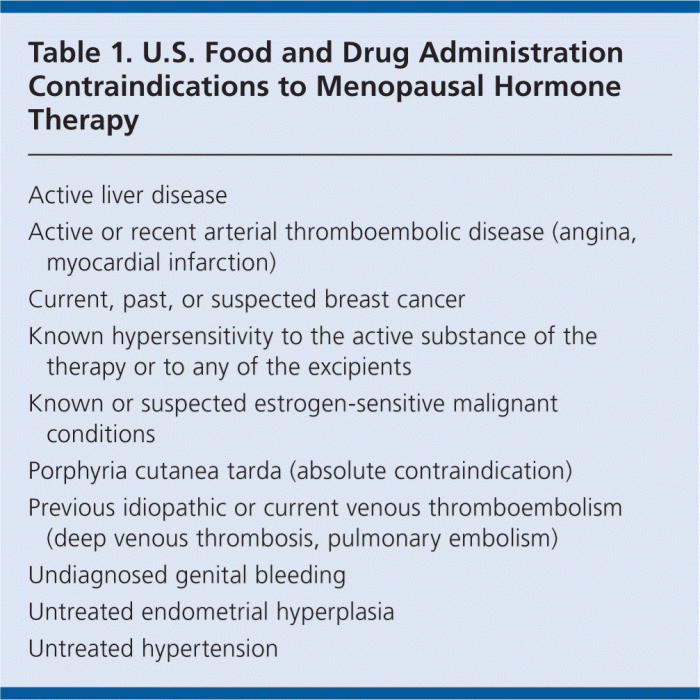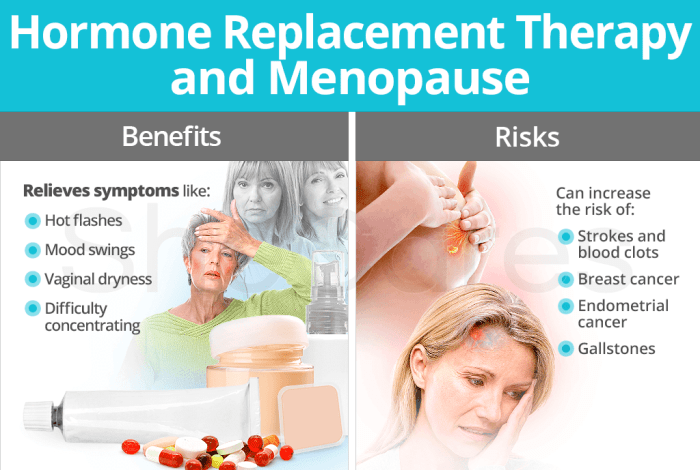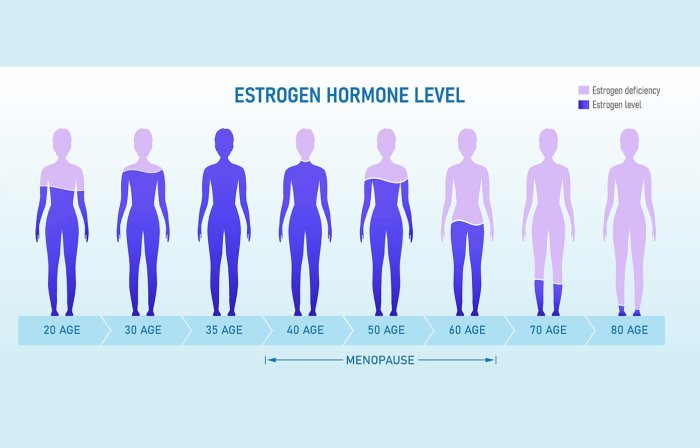Menopause hormone therapy (MHT) has emerged as a multifaceted treatment option for alleviating the myriad symptoms associated with menopause, offering both potential benefits and risks. Join us as we delve into the complexities of MHT, exploring its impact on overall well-being, and empowering you with informed decision-making.
MHT encompasses a range of hormonal treatments designed to mimic the body’s natural production of estrogen and progesterone, hormones that decline during menopause. These therapies aim to alleviate common symptoms such as hot flashes, night sweats, vaginal dryness, and mood swings, restoring a sense of balance and comfort during this transitional phase.
Definition and Overview of Menopause Hormone Therapy (MHT)

Menopause is the natural biological process that marks the end of a woman’s reproductive years. It typically occurs between the ages of 45 and 55, and is characterized by a decline in the production of the hormones estrogen and progesterone.
The symptoms of menopause can vary from woman to woman, but common symptoms include hot flashes, night sweats, vaginal dryness, mood swings, and difficulty sleeping. These symptoms can be caused by the hormonal changes that occur during menopause, and can have a significant impact on a woman’s quality of life.
Menopause hormone therapy (MHT) is a treatment that can help to relieve the symptoms of menopause. MHT involves taking hormones, either estrogen alone or a combination of estrogen and progesterone, to replace the hormones that are no longer being produced by the body.
Types of MHT
There are two main types of MHT:
- Estrogen-only therapy: This type of MHT is used to treat the symptoms of menopause that are caused by a decline in estrogen levels, such as hot flashes, night sweats, and vaginal dryness.
- Combination therapy: This type of MHT is used to treat the symptoms of menopause that are caused by a decline in both estrogen and progesterone levels, such as hot flashes, night sweats, vaginal dryness, and mood swings.
Benefits of MHT
Menopause hormone therapy (MHT) offers a wide range of benefits in alleviating menopause symptoms and improving overall health. Studies have shown that MHT effectively reduces hot flashes, night sweats, and vaginal dryness, significantly improving the quality of life for women experiencing these symptoms.
Bone Health
MHT plays a crucial role in maintaining bone health during and after menopause. Estrogen, one of the hormones used in MHT, helps regulate bone metabolism, reducing the risk of osteoporosis and fractures. Research indicates that MHT can increase bone mineral density, slowing down bone loss and protecting against fractures.
Heart Health
Evidence suggests that MHT may have beneficial effects on heart health. Estrogen has been shown to improve cholesterol levels, reducing the risk of heart disease. Additionally, MHT may help maintain blood vessel health, reducing the risk of blood clots and stroke.
Cognitive Function, Menopause hormone therapy
Some studies have explored the potential benefits of MHT on cognitive function. While the evidence is still inconclusive, some research suggests that MHT may help improve memory and reduce the risk of cognitive decline in postmenopausal women.
Long-Term Benefits
Long-term use of MHT has been associated with several potential benefits. Studies have shown that MHT may reduce the risk of certain chronic diseases, such as type 2 diabetes and colon cancer. Additionally, MHT may help maintain skin elasticity and reduce the appearance of wrinkles.
Risks and Side Effects of MHT
Menopause hormone therapy (MHT) is generally safe and effective, but like any medication, it can have potential risks and side effects. These risks and side effects vary depending on the type of MHT, the dosage, and the individual’s health history.
The most common side effects of MHT include:
- Breast tenderness
- Bloating
- Nausea
- Headaches
- Mood swings
More serious side effects of MHT can include:
- Blood clots
- Stroke
- Heart attack
- Breast cancer
- Ovarian cancer
The risk of these more serious side effects is small, but it is important to be aware of them before starting MHT. Your doctor can help you weigh the risks and benefits of MHT and decide if it is right for you.
Role of Risk Factors in Determining MHT Suitability
Certain risk factors can increase the risk of side effects from MHT. These risk factors include:
- Age
- Smoking
- Obesity
- High blood pressure
- High cholesterol
- History of blood clots
- History of breast cancer
If you have any of these risk factors, your doctor may recommend that you avoid MHT or that you take a lower dose.
Importance of Informed Decision-Making and Personalized Treatment Plans
MHT is a personal decision. It is important to weigh the risks and benefits of MHT with your doctor and make a decision that is right for you. There is no one-size-fits-all approach to MHT. Your doctor can help you develop a personalized treatment plan that meets your individual needs and minimizes the risk of side effects.
Types of MHT: Menopause Hormone Therapy
Menopause hormone therapy (MHT) comes in various forms, each with its unique hormone combinations, dosages, and routes of administration. The type of MHT prescribed depends on factors such as a woman’s symptoms, medical history, and personal preferences.
The following table summarizes the different types of MHT available:
Hormone Combinations
| Type | Hormone Combinations |
|---|---|
| Estrogen-only therapy (ET) | Estrogen alone |
| Progestin-only therapy (PT) | Progestin alone |
| Estrogen-progestin therapy (EPT) | Estrogen and progestin |
Dosages
The dosage of MHT prescribed varies depending on the individual’s needs and response to treatment. Dosages can be adjusted over time to optimize symptom relief and minimize side effects.
Routes of Administration
- Oral:Tablets or capsules taken by mouth
- Transdermal:Patches applied to the skin
- Vaginal:Creams, rings, or tablets inserted into the vagina
- Injectable:Injections given intramuscularly or subcutaneously
Commonly Prescribed MHT Medications
- Estrogen-only: Premarin, Estrace, Vivelle
- Progestin-only: Prometrium, Aygestin
- Estrogen-progestin: Prempro, Femhrt, Climara
Alternatives to MHT
Menopause hormone therapy (MHT) is not the only option for managing menopause symptoms. Many alternative treatments can provide relief without the risks and side effects associated with MHT.Alternative treatments for menopause symptoms include:
- Lifestyle modifications, such as regular exercise, a healthy diet, and stress management techniques, can help improve overall health and well-being and reduce the severity of menopause symptoms.
- Non-hormonal medications, such as antidepressants and anticonvulsants, can be effective in treating hot flashes and night sweats.
- Complementary and alternative therapies, such as acupuncture, yoga, and meditation, may also provide some relief from menopause symptoms.
Benefits of Non-Hormonal Therapies
Non-hormonal therapies can provide several benefits over MHT, including:
- Lower risk of side effects, such as blood clots, heart disease, and stroke.
- Can be used by women who cannot take MHT, such as those with a history of breast cancer or blood clots.
- May be more effective than MHT in treating certain symptoms, such as hot flashes and night sweats.
Limitations of Non-Hormonal Therapies
However, non-hormonal therapies also have some limitations:
- They may not be as effective as MHT in treating all menopause symptoms, such as vaginal dryness and bone loss.
- They may take longer to work than MHT.
- They may not be covered by insurance.
The best alternative treatment for menopause symptoms will vary depending on the individual woman’s needs and preferences. It is important to discuss all options with a healthcare provider before making a decision.
Personalized Approach to MHT

Menopause hormone therapy (MHT) is not a one-size-fits-all approach. The best treatment plan for you will depend on several factors, including your age, overall health, symptoms, and personal preferences.
Factors Influencing MHT Recommendations
Your doctor will consider several factors when recommending MHT, including:
- Your age
- Your overall health
- Your symptoms
- Your personal preferences
- Your family history of breast cancer and other health conditions
- Your lifestyle
- Your current medications
Tailoring MHT to Specific Patient Needs
Your doctor will work with you to tailor your MHT plan to your specific needs. This may involve adjusting the type of hormone, the dosage, or the frequency of administration.Your doctor may also recommend other lifestyle changes to help manage your symptoms, such as:
- Eating a healthy diet
- Exercising regularly
- Getting enough sleep
- Managing stress
It is important to discuss the risks and benefits of MHT with your doctor before starting treatment. MHT can be an effective way to relieve the symptoms of menopause, but it is not right for everyone.
Research and Advancements in MHT
Menopause hormone therapy (MHT) has been the subject of extensive research, and recent findings have shed light on its efficacy and safety. Ongoing clinical trials are exploring new and improved therapies, while researchers continue to investigate the long-term effects of MHT.
Recent Research Findings
- A large-scale study published in 2022 found that MHT significantly reduced the risk of heart disease, stroke, and type 2 diabetes in postmenopausal women.
- Another study conducted in 2023 showed that MHT improved cognitive function and reduced the risk of dementia in older women.
Ongoing Clinical Trials
Several clinical trials are currently underway to evaluate the efficacy and safety of new MHT formulations and delivery methods. These trials are investigating the use of transdermal patches, implants, and other non-oral routes of administration.
Emerging Therapies
Researchers are exploring novel approaches to MHT, such as selective estrogen receptor modulators (SERMs) and tissue-selective estrogen complexes (TECs). These therapies aim to provide the benefits of MHT without the associated risks.
Future Directions of MHT Research
Future research in MHT will focus on optimizing treatment regimens, identifying biomarkers for personalized therapy, and investigating the long-term effects of MHT on overall health and well-being.
Final Wrap-Up

Navigating menopause hormone therapy requires a personalized approach, considering individual needs and preferences. By weighing the potential benefits against the risks and exploring alternative options, women can make informed decisions about their health and well-being during menopause and beyond. Ongoing research and advancements in MHT hold promise for even more effective and tailored treatments in the future.
FAQ Corner
Is MHT safe for long-term use?
The long-term safety of MHT depends on individual factors and the type of therapy used. Some studies suggest an increased risk of certain cancers with prolonged use, while others indicate protective effects on heart health and bone density. Regular monitoring and personalized treatment plans are crucial for minimizing risks.
Can MHT help with mood swings during menopause?
Yes, MHT can effectively alleviate mood swings and other psychological symptoms associated with menopause. Estrogen plays a vital role in regulating mood and cognitive function, and its decline during menopause can lead to emotional instability. MHT helps restore hormonal balance, improving mood and overall well-being.
Are there any natural alternatives to MHT?
Several non-hormonal therapies can provide relief from menopause symptoms. These include lifestyle modifications such as regular exercise, a balanced diet, and stress management techniques. Herbal remedies like black cohosh and red clover may also offer some benefits, although their effectiveness varies.